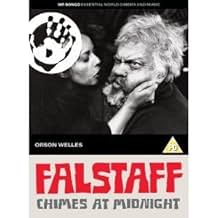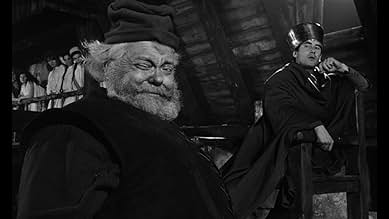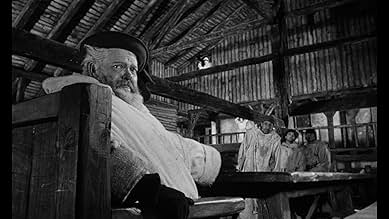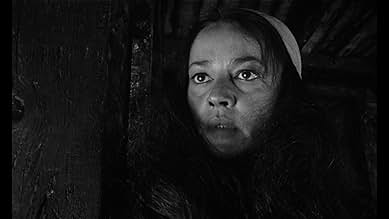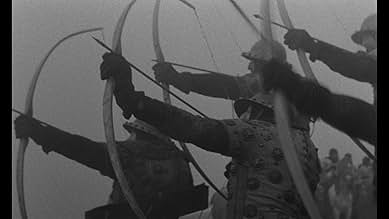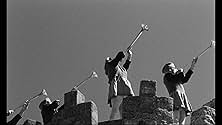IMDb RATING
7.6/10
11K
YOUR RATING
When King Henry IV ascends to the throne, his heir, the Prince of Wales, is befriended by Sir John Falstaff, an old, overweight, fun-loving habitual liar. Through Falstaff's eyes we see the ... Read allWhen King Henry IV ascends to the throne, his heir, the Prince of Wales, is befriended by Sir John Falstaff, an old, overweight, fun-loving habitual liar. Through Falstaff's eyes we see the reign of King Henry IV and the rise of Henry V.When King Henry IV ascends to the throne, his heir, the Prince of Wales, is befriended by Sir John Falstaff, an old, overweight, fun-loving habitual liar. Through Falstaff's eyes we see the reign of King Henry IV and the rise of Henry V.
- Director
- Writers
- Stars
- Nominated for 1 BAFTA Award
- 3 wins & 2 nominations total
Michael Aldridge
- Pistol
- (as Michael Aldrich)
Andrés Mejuto
- Woman's Tailor
- (as Andres Mejuto)
José Nieto
- Northumberland
- (as Jose Nieto)
- Director
- Writers
- All cast & crew
- Production, box office & more at IMDbPro
Featured reviews
The career of Shakespeare's Sir John Falstaff (Orson Welles) as roistering companion to young Prince Hal (Keith Baxter), circa 1400-1413.
Who can say bad things about Orson Welles? His work was often neglected in his lifetime, both by audiences and critics. Looking back now, I wonder how they could have missed the genius of "Citizen Kane". But yet, they did for many years.
This film is considered to be Welles' favorite of his own (I am unsure of the source for this claim) and has been influential. Yet, it is hard to get a decent copy (the one I have was a Portuguese import). There was no actor with such a presence as Welles, so Shakespeare is natural for him. He has successfully brought the stage to screen.
Who can say bad things about Orson Welles? His work was often neglected in his lifetime, both by audiences and critics. Looking back now, I wonder how they could have missed the genius of "Citizen Kane". But yet, they did for many years.
This film is considered to be Welles' favorite of his own (I am unsure of the source for this claim) and has been influential. Yet, it is hard to get a decent copy (the one I have was a Portuguese import). There was no actor with such a presence as Welles, so Shakespeare is natural for him. He has successfully brought the stage to screen.
Shakespeare Scholars are always complaining how this film used and abused Shakespeare's plays but I think what was done in this film was pretty clever: Take the character of Falstaff from several plays and piece them together to get a complete picture of the man.
Of the two Orson Welles Shakespeare films I've seen, this one and "Othello" (1954), both had the ability to make me want to read Shakespeare's plays and any film that makes you want to read what the author wrote is a very positive thing to say about a film. So there Shakespeare Scholars!
I did go out and buy the books with the plays used in this film, much like trying to solve a puzzle to see how the pieces really fit. And Orson did twist and bend things a little to make it come out his way.
I also read in Videohound's "World Cinema" (1999) by Elliot Wilhelm that this film may be getting a restoration. If it's as good a restoration as "Othello", I'm looking forward to it!
Welles as Falstaff really shines in this film and Falstaff's later rejection by Henry V is one of the most sobering in cinema. And Welles still has some very creative power left in him by 1965, look at the Battle of Shrewsbury scenes. When it comes to battle scenes they've been done probably only 10 different ways by 1000 directors in a 1000 movies over the years, but this one is probably the most memorable. It's also strange to have in the heat of battle Falstaff looking like a big metal beach ball running around back and forth trying to avoid any conflict.
This film is also a good example of good music and how to use it in a film and it's another one of my favorite movies about Merrie ol' England.
Of the two Orson Welles Shakespeare films I've seen, this one and "Othello" (1954), both had the ability to make me want to read Shakespeare's plays and any film that makes you want to read what the author wrote is a very positive thing to say about a film. So there Shakespeare Scholars!
I did go out and buy the books with the plays used in this film, much like trying to solve a puzzle to see how the pieces really fit. And Orson did twist and bend things a little to make it come out his way.
I also read in Videohound's "World Cinema" (1999) by Elliot Wilhelm that this film may be getting a restoration. If it's as good a restoration as "Othello", I'm looking forward to it!
Welles as Falstaff really shines in this film and Falstaff's later rejection by Henry V is one of the most sobering in cinema. And Welles still has some very creative power left in him by 1965, look at the Battle of Shrewsbury scenes. When it comes to battle scenes they've been done probably only 10 different ways by 1000 directors in a 1000 movies over the years, but this one is probably the most memorable. It's also strange to have in the heat of battle Falstaff looking like a big metal beach ball running around back and forth trying to avoid any conflict.
This film is also a good example of good music and how to use it in a film and it's another one of my favorite movies about Merrie ol' England.
10ednlaura
This is one of the great Shakespearean adaptations and a true 'lost classic'. It's also the last masterpiece that Orson Welles directed in his lifetime, and with 'Citizen Kane,' 'Magnificent Ambersons' and 'Touch of Evil' comprises a quartet of major cinematic works that he accomplished.
The film is an inventive re-editing and condensation of Shakespeare's plays, spanning from the end of Richard II to the beginning of Henry V. The film focuses on the character of Jack Falstaff, played by Welles himself in a virtuoso performance. Falstaff's relationship with young Prince Hal (later Henry V) is explored, and uncannily parallels Welles' own experience with the young talents of Hollywood.
Chimes at Midnight can be a jarring experience due to inconsistent film quality, low budget sets and Welles' flair for shock cuts, but it's a truly rewarding experience once you adapt to the style and limitations.
There are several great performances, by John Gielgud as Henry IV, Keith Baxter as Hal and Norman Rodway as Hotspur, who seems like a predecessor to Kenneth Branagh.
Chimes at Midnight has a little of everything: low comedy, highly artistic camera angles, exciting battle scenes (the battle of Shrewesbury scene influenced Braveheart) and a deeply moving story that Welles has 'discovered' between the lines of Shakespeare's histories.
The film is an inventive re-editing and condensation of Shakespeare's plays, spanning from the end of Richard II to the beginning of Henry V. The film focuses on the character of Jack Falstaff, played by Welles himself in a virtuoso performance. Falstaff's relationship with young Prince Hal (later Henry V) is explored, and uncannily parallels Welles' own experience with the young talents of Hollywood.
Chimes at Midnight can be a jarring experience due to inconsistent film quality, low budget sets and Welles' flair for shock cuts, but it's a truly rewarding experience once you adapt to the style and limitations.
There are several great performances, by John Gielgud as Henry IV, Keith Baxter as Hal and Norman Rodway as Hotspur, who seems like a predecessor to Kenneth Branagh.
Chimes at Midnight has a little of everything: low comedy, highly artistic camera angles, exciting battle scenes (the battle of Shrewesbury scene influenced Braveheart) and a deeply moving story that Welles has 'discovered' between the lines of Shakespeare's histories.
Up front I think it's fair to admit that I have not read the plays Shakespeare wrote that provide the basis of this film and it's screenplay.
I've read Romeo and Juliet, Macbeth and Julius Ceaser and I'm blessed that my public education provided me that much. But when it comes to Henry the IV, V, or VI I'm pretty much in the dark.
Chimes of Midnight did not leave me in the dark however. Orson Welles, I think, did a wonderful job of translating Shakespeaian dialogue into action that could be understood, jokes that could be understood, dramatic tension that could be understood.
Not only do i realize I am 400 years removed from Shakespeare but I am also 53 years removed from whatever audience Orson Welles intended this for in in 1965.
But I don't feel removed from the artistry that it took to make this film.
I could follow the plot, I knew where characters were emotionally, and even better, I understood the jokes. Which, for me, was a huge windfall and a source of amazement.
Orson Welles was dead before I was even born and I find him totally captivating and engaging in this film. He's lovable, he's a rapscallion, he's larger than life and he breaks your heart when he's denied by the newly crowned king.
I'm coming to this as an outsider. I loved Citizen Kane and Touch of Evil, I immensely enjoyed F is for Fake, and I've been looking to engage in more films starring or directed by Orson Welles, and I walked away from this film feeling like it filled a gap.
Here was his passion for gorgeous cinematography, here was his love of the stage, here was his brilliance at translating plays, here was his love for acting here was his passion for entertainment.
At no point did this film drag for me, and even now, in 2017 did the battle scene not only engage, but surprise me. This IS masterclass film making and this film deserved a wider audience back in 1965 and it deserves it still today.
Absolutely riveting and amazing work.
I've read Romeo and Juliet, Macbeth and Julius Ceaser and I'm blessed that my public education provided me that much. But when it comes to Henry the IV, V, or VI I'm pretty much in the dark.
Chimes of Midnight did not leave me in the dark however. Orson Welles, I think, did a wonderful job of translating Shakespeaian dialogue into action that could be understood, jokes that could be understood, dramatic tension that could be understood.
Not only do i realize I am 400 years removed from Shakespeare but I am also 53 years removed from whatever audience Orson Welles intended this for in in 1965.
But I don't feel removed from the artistry that it took to make this film.
I could follow the plot, I knew where characters were emotionally, and even better, I understood the jokes. Which, for me, was a huge windfall and a source of amazement.
Orson Welles was dead before I was even born and I find him totally captivating and engaging in this film. He's lovable, he's a rapscallion, he's larger than life and he breaks your heart when he's denied by the newly crowned king.
I'm coming to this as an outsider. I loved Citizen Kane and Touch of Evil, I immensely enjoyed F is for Fake, and I've been looking to engage in more films starring or directed by Orson Welles, and I walked away from this film feeling like it filled a gap.
Here was his passion for gorgeous cinematography, here was his love of the stage, here was his brilliance at translating plays, here was his love for acting here was his passion for entertainment.
At no point did this film drag for me, and even now, in 2017 did the battle scene not only engage, but surprise me. This IS masterclass film making and this film deserved a wider audience back in 1965 and it deserves it still today.
Absolutely riveting and amazing work.
What can be said about Chimes at Midnight that hasn't already been said? Orson Welles' ode to Fallstaff, a part that Shakespeare obviously created with Welles' himself in mind, seems to be the perfect culmination of his enormous (no pun intended) career. The meager budget of the film is only reflected in the bad dubbing & sound quality, which is still glaring despite restoration efforts. Welles makes up for this in film noir lit faces, intense battle scenes, and of course, his impeccable acting & connection with the character. With the minute movement of his eye, he can garner laughter or sympathy. While we may be used to chuckling at Falstaff's bumbling, brazen arrogance, Welles also brings us, in the end, to profoundly feel the anguish that lies at the depths of Falstaff's soul. His performance seems to be a psychological study on fatherly influences, quite probably pulling from his experiences with his own Fallstaffian father, among others. Having recently watched My Own Private Idaho, it is hard not to make comparisons & observe the obvious inspiration Gus Van Sant drew from Chimes for his quintessential film. It was also interesting to watch the dramatic battle scenes, which on a shoestring budget are very cleverly shot & edited to feel big budget. This film has probably inspired many larger budget Shakespearean, war & movies in other genres, and yet stands in a league of its own.
Did you know
- TriviaDespite portraying Falstaff as a grossly obese man, Orson Welles actually had to diet to slim down for the role.
- GoofsThe corpse of Hotspur opens and closes his mouth several minutes after his death.
- ConnectionsFeatured in The 43rd Annual Academy Awards (1971)
- How long is Chimes at Midnight?Powered by Alexa
Details
- Release date
- Countries of origin
- Language
- Also known as
- Chimes at Midnight
- Filming locations
- Calatañazor, Soria, Castilla y León, Spain(London streets scenes)
- Production companies
- See more company credits at IMDbPro
Box office
- Budget
- $800,000 (estimated)
- Gross US & Canada
- $126,724
- Opening weekend US & Canada
- $13,630
- Jan 3, 2016
- Gross worldwide
- $126,724
- Runtime
- 1h 59m(119 min)
- Color
- Sound mix
- Aspect ratio
- 1.66 : 1
Contribute to this page
Suggest an edit or add missing content



